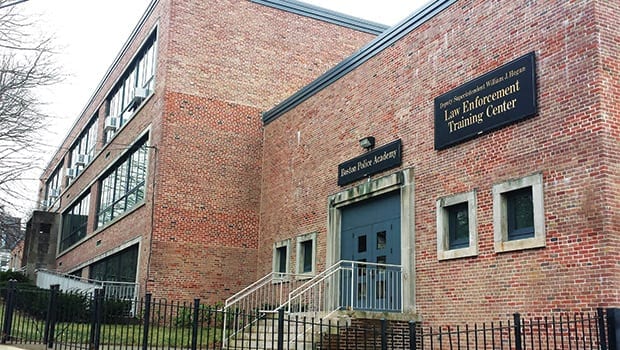
A Massachusetts Commission Against Discrimination ruling ordering the Boston Police Department to “cease and desist from the disparate treatment of recruits based on race” casts a public spotlight on what some say is a longstanding problem of discrimination against black officers in the department’s disposition of penalties for misconduct.
The ruling stemmed from a complaint by former recruit Claude Defay, alleging he was dismissed from the police training academy while white recruits who committed offenses similar to the one for which he was charged were given lesser sanctions.
Defay was dismissed from the academy after he allegedly asked a fellow recruit about a question on an exam during a bathroom break, a Class I offense that, according to department rules could result in dismissal from the academy. Yet white officers who committed offenses including public drunkenness, lying and engaging in a brawl outside a pub were given lesser punishments.
Massachusetts Association of Minority Law Enforcement Officials President Larry Ellison said Defay’s case was part of a wider pattern of discrimination against blacks in the police department’s academy.
“We get complaints all the time from people who are unfairly dismissed from the academy,” he said. “We have a hard time getting folks hired.”
The Banner could not verify Ellison’s claim. The Boston Police Department did not respond to a request for information on blacks and Latinos disciplined or dismissed from the academy.
Court-ordered integration
Since 2010, 61 employees and applicants have filed discrimination complaints based on race or ethnicity against the department with the Massachusetts Commission Against Discrimination, according to a spokesman for the state agency.
For decades, the police department’s hiring was done under the terms of a 1973 consent decree stemming from a 1970 NAACP lawsuit. The consent decree mandated that the department consider for hire one black or Latino applicant for every white applicant. For any applicants not admitted – white, black or Latino – the department was required to submit a written explanation to the NAACP’s lawyers. The consent decree was to remain in effect until the percentage of black and Latino officers on the force matched the percentage of blacks and Latinos living in Boston.
The percentage of black officers on the force rose from 3.5 percent in the 1970s to 24.6 percent in 2001, slightly greater than blacks’ 24 percent share of Boston’s population. In 2004, a federal judge ordered the consent decree lifted after a group of eight white officers sued the department claiming they were passed over for hire.
Veterans preference
Under the department’s current hiring policy, armed services veterans are given precedence over other applicants. Because there are far fewer people of color in Massachusetts serving in the armed services, the number of black and Latino candidates entering the department has declined precipitously in the years since the consent decree ended.
In the 2013 police academy class, 8 out of 57 graduates were people of color. In the 2014 class, 11 out of 63 graduates were people of color. Both MAMLEO and the Lawyers’ Committee for Civil Rights and Economic Justice have requested information on the current recruit class. The Lawyers’ Committee had not received a response to their Dec. 22 request by the Banner’s press deadline. Ellison said MAMLEO has not received a response either.
Because many officers hired in the 1980s are now retiring, Ellison said the number of blacks on the force could decline rapidly.
“Based on attrition alone, we’ll be extinct in 10 years,” he said. “The department has known this for a long time. They haven’t done anything to rectify the situation.”
Ellison said the BPD also is using background checks, including factors like employment history and credit, to exclude black and Latino applicants.
“Most of our folks are weeded out before they even get to the academy,” he said. “In most cases, people of color are held to higher standards than whites. There’s a lot of favoritism and nepotism.”
With fewer blacks and Latinos entering the academy, the number of complaints coming to MAMLEO is declining, said Jim Gilden, an attorney who represents MAMLEO.
“A lot of people have just given up,” he said. “So many people fight just to get into the academy.”







